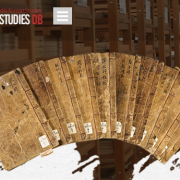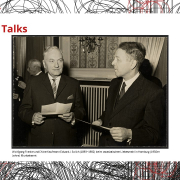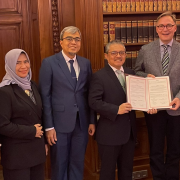Newsletter 33 – CrossAsia Highlights zum Jahresende
Liebe CrossAsia Nutzer:innen,
über die neuesten Entwicklungen bei CrossAsia informiert Sie dieser Newsletter in aller Kürze:
Jubiläums-Publikation der Ostasienabteilung – Zum Jahresende noch was zum Schmökern, Stöbern und fürs Auge
Anlässlich des Dreifach-Jubiläums der Ostasienabteilung der Staatsbibliothek zu Berlin im Jahr 2022:
- Gründung der Ostasienabteilung einhundert Jahre zuvor
- 70 Jahre Förderung durch die Deutsche Forschungsgemeinschaft als Sondersammelgebiet bzw. heute als Fachinformationsdienst Asien
- 400. Geburtstag von Christian Mentzel, Leibarzt des Großen Kurfürsten und erster Kurator der chinesischen Sammlung
konnten wir Dank der Unterstützung durch unsere Angebote nutzende Wissenschaftler:innen, von Sammlungsgeber:innen und Mitarbeiter:innen unseren Jubiläumsband „Sammellust und Wissensdrang : Vier Jahrhunderte Asiatica in Berlin“ veröffentlichen. In 42 Beiträgen auf 200 Seiten und mit gut 150 Abbildungen versehen, stellen sie ein Objekt bzw. Segment aus unseren Beständen vor, das für ihre Forschung bedeutsam war oder ist, geben Einblicke in die Geschichte und die Zukunft der Abteilung und beleuchten Aspekte der Sammlungsgeschichte.
Wir bedanken uns bei allen Beteiligten für die Unterstützung und Geduld bei diesem Projekt und wünschen Ihnen allen viel Spaß beim Lesen und Entdecken!
Gute Nachrichten: die vierte Förderphase für den FID Asien wurde soeben bewilligt
Wir haben gerade erfahren, dass die DFG unseren Antrag für die vierte Förderphase des FID Asien bewilligt hat! Damit können wir unsere Arbeit und Angebote für Sie in den kommenden drei Jahre fortsetzen und weiterentwickeln.
Mehr Informationen dazu folgen demnächst über unsere Info-Seiten.
Neue Reihen im CrossAsia Open Access Repository
Das CrossAsia Open Access Repository freut sich über die Aufnahme neuer Inhalte:
- „Japan Jahrbuch“ (2007-2022) der Vereinigung für sozialwissenschaftliche Japanforschung (VSJF). Weitere Jahrgänge folgen nach Ende der Embargofrist.
- AREA Ruhr Working Papers, Vol. 1 und 2: Langzeitarchiviert im Repository, weitere Bände in Planung.
- Blogbeiträge aus dem DFG-Projekt „Urban-rural migration and rural revitalization in Japan“ (2020-2024) und der zugehörige Sammelband „Lived experiences of crisis in rural Japan„.
Details zu den neuen Reihen und Beteiligten können im CrossAsia Blog nachgelesen werden.
Das CrossAsia Open Access Repository bietet Wissenschaftler:innen der Asienwissenschaften eine Plattform für Erst- und Zweitveröffentlichungen sowie Forschungsdaten. Das CrossAsia Open Access Repository archiviert langfristig und bietet gute Auffindbarkeit für die Fachcommunity und ist das von der Deutschen Forschungsgemeinschaft empfohlene Fachrepositorium für die Asienwissenschaften (DFG-White List für fachspezifische Repositorien).
Neu lizenzierte Datenbanken:
- Taiwan Governor’s Office Full-text Electronic Edition 台灣總督府府報:
- Umfasst mehr als 144.600 amtliche Aufzeichnungen die zwischen August 1896 und April 1942 während der japanischen Herrschaft über Taiwan entstanden sind. Die umfangreiche Volltextsuche erstreckt sich auch auf Tabellen und Graphiken.
- Japanese Colonial Period Periodicals 日治時期期刊集成:
- 60 Zeitschriften gewähren Einblicke in unterschiedliche Themenbereiche der Geschichte Taiwans während der japanischen Besatzungszeit. Über eine Metadatensuche gelangt man zu hochwertigen Scans der Periodika.
- Media Korean Studies:
- The Collection of Korean Geography, Customs, and History DB (한국지리풍속지): Die Datenbank enthält den umfassenden Index und das Inhaltsverzeichnis der 400 Bände der Korean Geography and Customs Series (韓國地理風俗誌叢書).
- The Series of Geography, History, and Customs of Manchuria-Mongolia DB (만몽지리풍속지): Ursprünglich veröffentlicht von der japanischen Regierungsgeneraldirektion von Korea (朝鮮總督府) während der japanischen Besatzungszeit. Die Bände decken eine Vielzahl von Themen ab, darunter Industrie, Handel, Diplomatie, ethnische Gruppen, Bräuche, Traditionen, Legenden, Volkslieder, Anekdoten, Ortsnamen, verschiedene Aufzeichnungen, Reiseberichte und Geschichten über die Mandschurei und die Mongolei, Regionen in Nordostchina.
Weitere Informationen hierzu im Blog.
CrossAsia Talks:
Nach der Sommerpause sind die CrossAsia Talks erfolgreich in eine neue Runde gestartet.
- 26.09.2024: Frau Dr. Barbara Wall (Universität Kopenhagen) hielt den Vortrag „The Dynamic Essence of Transmedia Storytelling: A Graphical Approach to the Journey to the West in Korea“. Sie stellte den im chinesischen Raum bekannten Roman „Die Reise nach Westen“ im Kontext der koreanischen Version vor. Ausführliche Informationen hierzu gibt es im Blog. Der Mitschnitt kann hier angesehen werden.
- 17.10.2024: Herr Prof. Dr. Vladimir Glomb (Freie Universität Berlin) präsentierte in seinem Onlinevortrag „The Master said (in Korean)…: Vernacular exegesis (ŏnhae) and Confucian classics“ seine Forschung zu koreanischen Übersetzungsstrategien aus dem Chinesischen anhand der Vier Bücher aus dem Bestand der Staatsbibliothek. Ausführliche Informationen hierzu gibt es im Blog.
- 07.11.2024: Der Vortrag „A Sample of Chinese Medicine for 17th-Century Europe“ von Gianna Pomata und Marta Hanson beleuchtete, wie Ideen der traditionellen chinesischen Medizin im 17. Jahrhundert nach Europa gelangten und wie der Wissenstransfer damals funktionierte. Ausführliche Informationen hierzu gibt es im Blog.
- 28.11.2024: Herr Stefan Messingschlager (Helmut-Schmidt-Universität/Universität der Bundeswehr Hamburg) referierte zum Thema „Pekingologie und wissenschaftliche China-Expertise in Deutschland nach 1949: Zur Scharnierfunktion des Sinologen Wolfgang Franke (1912–2007)“ und gab Einblicke in die Rolle und Praxis wissenschaftlicher China-Expertise nach 1949. Ausführliche Informationen hierzu gibt es im Blog.
- 12.12.2024: Dr. Franz Xaver Erhard (Universität Leipzig) stellte im Vortrag „From Print to Digital: Making Available Tibetan Newspapers as a Historical Source“ das Forschungsprojekt Divergent Discourses vor und ging insbesondere auf die Verwendung und Bedeutung von Digital Humanities-Methoden in seiner Forschung ein. Ausführliche Informationen hierzu gibt es im Blog.
Neue Kooperation:
Am 20.11.2024 unterzeichneten Prof. Dr. Achim Bonte, Generaldirektor der Staatsbibliothek zu Berlin, und Dr. Deni Kurniadi, stellvertretender Direktor der Nationalbibliothek Indonesiens, ein Memorandum of Understanding. Ziel der Vereinbarung ist es, die Zusammenarbeit zwischen beiden Institutionen zu stärken und den Austausch von Wissen und Ressourcen zu fördern. Weitere Informationen finden Sie auf unserem Blog.
Stipendienprogramm der Staatsbibliothek zu Berlin:
Stipendiaten der Staatsbibliothek stellen im Rahmen der CrossAsia Talks ihre Forschungen vor:
- Am 14. Mai 2024 hielt Dr. Tang Sanjiao (Academia Sinica, Taiwan) im Rahmen der CrossAsia Talks einen Vortrag zum Thema „Contested Categories: Disputes over Medical Jurisdiction in Republican China“. In seinem Vortrag beleuchtete Dr. Tang die Auseinandersetzungen über medizinische Zuständigkeiten in der republikanischen Ära Chinas. Dabei zeigte er, wie traditionelle und moderne medizinische Ansätze miteinander konkurrierten und welche Auswirkungen diese Konflikte auf die Entwicklung des Gesundheitssystems und medizinischer Praktiken hatten.Die Veranstaltung bot wertvolle Einblicke in die dynamische Beziehung zwischen Politik, Gesellschaft und Medizin in einer Zeit des Wandels und wurde über Webex gestreamt. Sein Gastbeitrag kann hier gelesen werden: Gastbeitrag von Dr. Sanjiao Tang
- Am 20. Juni 2024 präsentierte der SPK-Stipendiat Forrest McSweeney (Staatsbibliothek zu Berlin, Ostasienabteilung) im Rahmen seines Projekts „Medicine at Arms“ den Vortrag „Military Medical Legacy: The Impact of Military Drug Distribution on the Pharmaceutical Field in Qing and Early Republican China“.Im Vortrag beleuchtete er, wie die medizinische Versorgung des Militärs im 18. und 19. Jahrhundert die medizinische Praxis und das pharmazeutische Feld prägte. Thematisiert wurden die Verteilung von Arzneien durch die Qing-Dynastie, ihre Auswirkungen auf medizinische Publikationen und die enge Verbindung zwischen Militär und Medizin bis in die republikanische Ära.Der Vortrag wurde über Webex gestreamt und bot spannende Einblicke in die historischen Wechselwirkungen zwischen Staat, Militär und Medizin. Sein Gastbeitrag kann hier gelesen werden: Gastbeitrag von Forrest Cale McSweeney
- Am 05. Mai 2025 um 18 Uhr wird Herr Lukáš Kubík (Karls-Universität, Prag) im Rahmen eines Onlinevortrags seine Forschungsergebnisse zum Thema „(Un)official Korean Sources on late Koryŏ in the Staatsbibliothek zu Berlin’s East Asian Collection“ präsentieren.In seinem Vortrag beleuchtet Herr Kubík die in der Ostasienabteilung der Staatsbibliothek zu Berlin aufbewahrten koreanischen historischen Quellen aus der späten Koryŏ-Zeit. Der Fokus liegt dabei sowohl auf offiziellen Geschichtsdarstellungen als auch auf inoffiziellen Dokumenten, die persönliche Perspektiven und alternative Einsichten in die Geschichte bieten. Diese umfassen unter anderem Bildungstexte aus privaten Akademien (Sŏwŏn) sowie die Munjip, die gesammelten Schriften von Gelehrten und Literaten. Sein Gastbeitrag kann vorab hier gelesen werden: Gastbeitrag von Lukáš Kubík
Rückblick: Hackathon zur Layouterkennung tibetischer Handschriften und Blockdrucke
Am 22. November 2024 fand in Dresden ein Hackathon statt, organisiert von Cloud & Heat in Zusammenarbeit mit AI Insights Saxony. Einer der beiden Use Cases wurde vom CrossAsia-Team bereitgestellt: die Layouterkennung tibetischer Handschriften und Blockdrucke. Ziel war es, die verschiedenen Elemente auf den Seiten, wie den Schriftblock, tibetische und gegebenenfalls chinesische Seitenzahlen sowie Illustrationen, zu identifizieren.
Um den Teilnehmer:innen die Besonderheiten vormoderner tibetischer Handschriften und Blockdrucke näherzubringen, wurden ausgewählte Objekte aus der Sammlung nach Dresden geschickt. Diese wurden im Rahmen einer kleinen Ausstellung präsentiert, die auf reges Interesse stieß und die Vielfalt der tibetischen Schriftkultur eindrucksvoll verdeutlichte.
Im Laufe des Hackathons entstand ein Tool, das auf einem bereitgestellten Large Language Model basiert und das Layout tibetischer Texte bereits relativ zuverlässig erkennen kann. Als kleine Anerkennung erhielten die Teilnehmer:innen einen CrossAsia-Beutel mit verschiedenen Mitbringseln.
Das Projekt bleibt jedoch nicht beim Hackathon: Einige Teilnehmer:innen zeigten großes Interesse an der weiteren Arbeit an der tibetischen Layouterkennung und planen, die Entwicklungen fortzusetzen.
Wir danken Cloud & Heat für die Einladung und Nico Hoffmann für die Initiative und die Idee zur Kooperation! Weitere Informationen finden Sie im dazugehörigem Blogbeitrag.
Ausblick für das neue Jahr:
- CrossAsia Talk mit Thies Staack:
- Der erste CrossAsia Talk im neuen Jahr findet am 20. Februar statt. Es erwartet Sie eine spannende Präsentation von Dr. Thies Staack (Universität Hamburg) zum Thema „The Provenance of the Chinese Medical Manuscripts in the Unschuld Collection: New Evidence from an Unpublished Acquisition Notebook“. Der Vortrag wird die umfangreiche Sammlung Unschulds mit chinesischen medizinischen Handschriften in den Blick nehmen, sich aber erstmals und mittels einer bisher unveröffentlichten Quelle aus dem Besitz von Herrn Prof. Paul U. Unschuld der Provenienz der Handschriften widmen wird. Weitere Informationen gibt es in unserem Blog.
- Auch im nächsten Jahr werden wieder Beiträge im Rahmen der CrossAsia Talks angeboten, um den wissenschaftlichen Austausch über ost-, südost- und zentralasiatische Materialien und Themen aktiv zu bereichern.
Wir wünschen Ihnen einen guten Rutsch und einen erfolgreichen Start ins neue Jahr! Wir freuen uns auf den gemeinsamen Austausch mit Ihnen nach der Winterpause.
Ihr CrossAsia Team

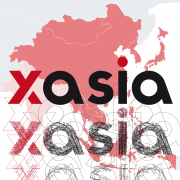
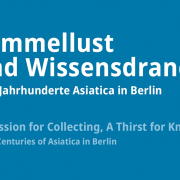
 Tang Sanjiao
Tang Sanjiao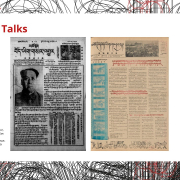
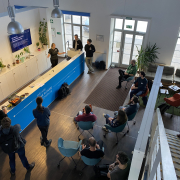 Cloud & Heat
Cloud & Heat

